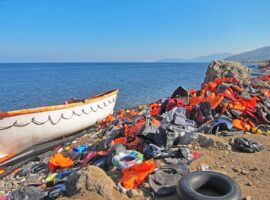In the recent devastating Greece migrant shipwreck, an approximate 750 lives – up to 100 children – were put at risk in a desperate bid for a better future. The incident has been overshadowed by another maritime disaster; the missing Titanic submersible, which had five people onboard. As the world directs its attention to these parallel maritime disasters, the glaring discrepancies in the media coverage and social sentiment raise poignant questions about our collective values and priorities.
The Greece migrant shipwreck occurred when the poorly equipped vessel, overcrowded with migrants predominantly from Africa and Middle East, was tragically capsized in the Aegean Sea. The exact reason for the ship sinking is still under investigation; however, preliminary reports point towards adverse weather conditions and the boat being far beyond its carrying capacity.
The Greek coast guard, tasked with safeguarding the nation’s maritime borders, responded to the distress call. In a recent BBC investigation, the news organization “has obtained evidence casting doubt on the Greek coastguard’s account of Wednesday’s migrant shipwreck in which hundreds are feared to have died.
Analysis of the movement of other ships in the area suggests the overcrowded fishing vessel was not moving for at least seven hours before it capsized.
The coastguard still claims that during these hours the boat was on a course to Italy and not in need of rescue.
Greek authorities have not yet responded to the BBC’s findings.
At least 78 people are known to have died, but the UN says up to 500 are still missing.
The UN has called for an investigation into Greece’s handling of the disaster, amid claims more action should have been taken earlier to initiate a full-scale rescue attempt.”
Meanwhile, the world seems fixated on the missing Titanic submersible, an exploration vehicle carrying five affluent men, lost in the North Atlantic. The unequal attention and resources dedicated to these two tragedies underscore an uncomfortable truth about the perceived value of human lives based on social status and wealth.
The Greece migrant shipwreck represents a broader, more complex issue, touching on geopolitical strife, economic disparity, and global indifference. The world watches in anticipation as high-profile explorers and wealthy hobbyists venture into the deep sea, while turning a blind eye to the plight of the many thousands of desperate people trying to cross borders and seas for the same essential human aspiration – the desire for a safe and better life.
These concurrent maritime disasters hold a mirror to society, revealing an uncomfortable image of disparity. The world is more captivated by the adventurous exploits of the affluent few than the life-and-death struggle of vulnerable masses. It’s an unfortunate reality that despite the increasing frequency of such migrant disasters, they are often overlooked by a global community that seems more concerned with a missing submersible.
The Greece migrant shipwreck and the missing Titanic submersible are not just maritime tragedies. They are stark reminders of an unbalanced world, where the value of human life is perceived differently based on wealth and social status. These disasters should be a wake-up call for us to reassess our values and priorities, redefining our empathy for vulnerable migrants seeking asylum, economic opportunities and a safe place to call home.

